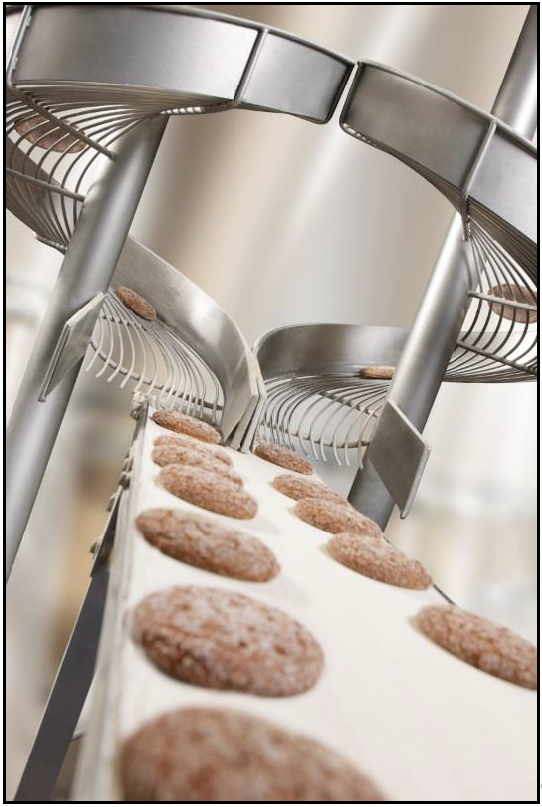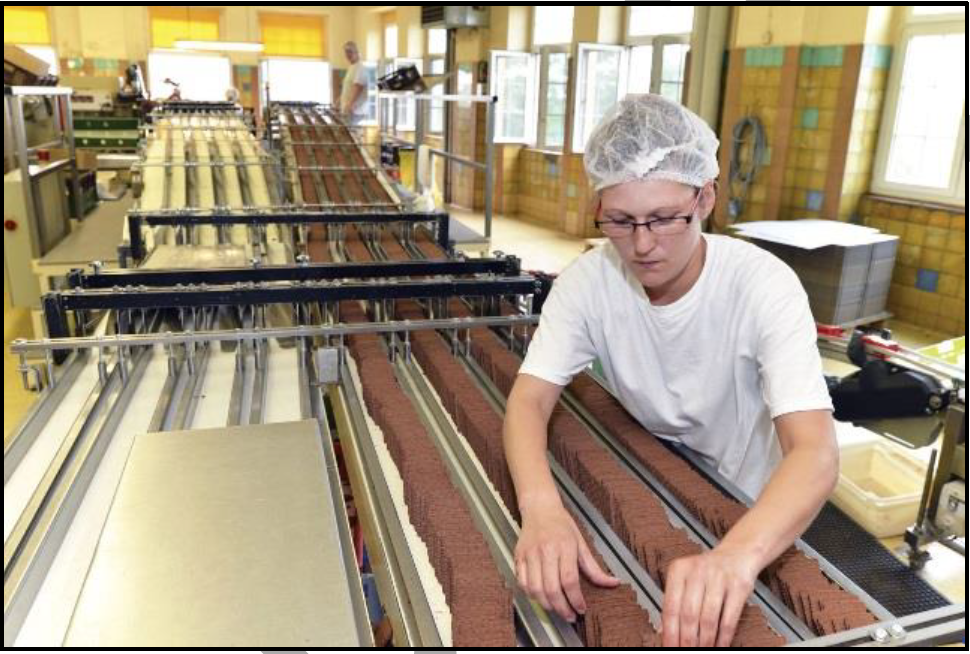Bake to the future
 As the demands on the bakery production process become higher, and margins become tighter, ABB’s Andrew Bould, explains how variable speed drives (VSDs) and low voltage motors can help to increase profitability without compromising quality.
As the demands on the bakery production process become higher, and margins become tighter, ABB’s Andrew Bould, explains how variable speed drives (VSDs) and low voltage motors can help to increase profitability without compromising quality.
Changing consumer habits and tastes means bakeries not only need to produce identical, high volume products, but also small batches of bespoke goods, with customers demanding ever shorter delivery times. This flexibility is being demanded on top of stringent requirements for safety, and the need for maximum productivity, energy efficiency and reliability.
Industrial motors account for almost two thirds of the electricity consumed by UK industry (1). With the price of energy continuing to increase, there is a considerable incentive to reduce consumption in this field. Many motors are run without variable speed control, meaning they can only ever run at full power irrespective of demand. This is clearly wasteful. By using a variable speed drive to control motor output, energy-intensive sectors like baked goods can substantially reduce their costs. As well as saving energy, modern variable speed drives also come packed with features to benefit safety, productivity and reliability.
Food and personnel safety
Plant and machinery incidents are one of the main causes of major injury in bakeries (2), second only to slips and trips (3). Almost everywhere you look in the bakery facility, from mixers and conveyors to moulders and slicers, there is a risk to personnel.
VSDs incorporate a multitude of safety features to reduce risk. Safe torque off (STO) is a function that when activated immediately switches off the drive output to the motor, and ensures that it cannot be unexpectedly restarted (4). Injuries can often occur during maintenance or cleaning of machinery, while STO ensures that power cannot reach the motor until personnel are clear.
Flour dust is an occupational hazard of working in bakery production. Prolonged exposure can lead to eye and nose irritation, dermatitis and asthma (5). Reducing flour dust as far as practicable can be achieved by using an extraction system, typically involving motors and fans. A drive ensures that an extraction system runs at optimal levels at all times, based on real-time data from the factory floor, to keep dust levels to a minimum. If dust levels are already low, then motors can be run at a lower speed to reduce energy consumption and costs.
Flour dust is also flammable and sometimes explosive. Dust ignition certified motors, constructed from aluminium or cast iron are available in both low and high voltages that fulfil EN standards and ATEX directives, to limit the possibility of dust explosions (6).
Energy efficiency
Ovens are responsible for 35-45 percent of bakery energy use (7), making them a prime candidate for variable speed control. VSD fan control efficiently circulates airflow to regulate temperature and moisture, leading to shorter baking times. This results in less oven use and typically 20 to 60 percent energy savings.
Belt conveyors, although fixed speed rather than variable, can also achieve efficiency savings. Motor and drive packages can be used to ensure that goods are moved smoothly and uniformly to eliminate high peak starting loads and avoid drivetrain damage.
ABB has developed a sensor that fits directly to motors, pumps and bearings, instantly turning them into smart, wirelessly connected devices that can provide real-time performance and efficiency data. The ABB Ability™ Smart Sensor can be fitted to any ABB or non ABB motor, and measures key parameters such as temperature and vibration from the surface of the equipment. This information can be used to identify inefficiencies, and plan the maintenance based on actual condition rather than generic maintenance schedules. This shift away from reactive to predictive maintenance helps to prevent unplanned downtime, cut costs and extend equipment lifetimes (8).
Productivity
Today, demand is for smaller and larger batches, with more variants and an ever shorter time to market. Production must be agile to adapt quickly to meet evolving customer tastes. However, changing fixed speed equipment and resetting line s to provide varying production volumes takes time and money. VSDs allow greater flexibility in ramping production lines up and down, as any change in speed requirements can be implemented quickly without the need for lengthy configuration and calibration.
Applications include using VSDs to directly control cooling water through PID control. This yields product quality benefits as temperature spikes are avoided. Using direct drive motor technology with cooling towers makes for easier maintenance as the gearbox, bearings, couplings and shafts are no longer required.
Precision control of motors leads to higher consistency. For instance in dough proving, using VSDs to control air temperature, humidity and flow more accurately can improve the texture, quality and uniformity of products passing through provers and ovens. Accurate dosing and precise speed and torque control can also reduce wastage and increase
product quality during the mixing and forming stages.
Maintenance & operations
Operational costs must be controlled without compromising the safety of the plant, personnel or end product. Meanwhile, getting access to the right data from across the bakery production line, and turning it quickly into useful information has traditionally been a challenge. Now the whole powertrain (i.e. motors, drives, mechanical components including
mounted bearings and pumps) can be equipped with sensors, and monitored for condition, performance and efficiency across all component parts. Data gathered from the VSD and sensors can be analysed in real-time to reveal equipment status and condition, and provide a granular view of maintenance requirements at any given time.
This helps to facilitate a shift from reactive to predictive maintenance. Basing maintenance schedules on what is actually going on inside a motor or pump means that potential problems can be identified and remedied long before they risk failure. For instance, anti-cavitation software can help to detect the build-up of foam inside pipes, and automatically
provide an alert to maintenance teams that the pumps may require attention. Temperature, load, under/overvoltage can all be markers for potential equipment failure, and modern motors and VSDs allow unprecedented visibility across all motor-driven applications in the baking process, from whole processes down to individual components.
Equipment must also be able to deliver consistently high performance without compromising hygiene. Equipment must be regularly washed down, which can shorten operational life. Paint free motors avoid paint flakes contaminating ingredients, while IP69 stainless steel motors are built to withstand the gruelling demands of washdown environments.
In conclusion
Motors and drives typically offer high reliability and when well maintained can easily last for several decades. This, however, means that they are rarely replaced, with many bakeries running legacy equipment that might be 10 or 20 years old, and therefore missing out on many of the new technologies and techniques that can meet the challenges of the
modern bakery.
The cost of replacing an entire installed base can seem high, but this does not factor in the potential gains made in productivity and efficiency, which can be significant. Once you consider the improved safety, efficiency and process visibility, along with the reduced maintenance costs, the modern motor and drive package can start delivering increased
profitability from the day it is installed.
What is a variable speed drive?
Variable speed drives (VSDs) are used to regulate the speed of motors, which are installed within many applications and processes throughout the bakery, from mixing and baking to packaging and refrigeration. Traditionally a motor’s speed would be controlled mechanically, using vanes and dampers to throttle output. This is a bit like driving a car with your
foot down on the accelerator and using only the brake to try and control your speed. As well as wasting energy, this causes huge strain on components, and can make it more difficult to achieve precise control of output.
A VSD regulates motors by varying input frequency and voltage, so that it only uses the required level of power at any given time. The impact on energy consumption is profound, and for high intensity applications like baking ovens and HVAC systems in particular, costs can be significantly reduced. Indeed, running a motor at 80 percent speed requires just 50 percent of the energy. As well as reducing energy consumption, additional benefits of VSDs can be seen across the entire bakery process, from proving to packaging.
ABB (ABBN: SIX Swiss Ex) is a pioneering technology leader with a comprehensive offering for digital industries. With a history of innovation spanning more than 130 years, ABB is today a leader in digital industries with four customer-focused, globally leading businesses: Electrification, Industrial Automation, Motion, and Robotics & Discrete Automation,
supported by its common ABB Ability™ digital platform. ABB’s market-leading Power Grids business will be divested to Hitachi in 2020. ABB operates in more than 100 countries with about 147,000 employees. www.abb.com
References:
(1) https://www.carbontrust.com/resources/guides/energy-efficiency/motors-and-drives/
(2) https://www.fob.uk.com/wp-content/uploads/2018/07/BAKERS-DOZEN-MASTER-DEC-2014-July-2018-amendments.pdf
(3) http://www.infopreben.com/index.php/item/download/64_5e0c8f1156c01f64494e14d75dfad7dd
(4) https://new.abb.com/drives/functional-safety/typical-safety-functions
(5) http://www.hse.gov.uk/food/bakery.htm
(6) https://new.abb.com/motors-generators/motors-and-generators-for-explosive-atmospheres/dust-ignition-proof-motors
(7) https://www.carbontrust.com/media/206476/ctg034-bakery-industrial-energy-efficiency.pdf
(8) https://new.abb.com/motors-generators/service/advanced-services/smart-sensor

